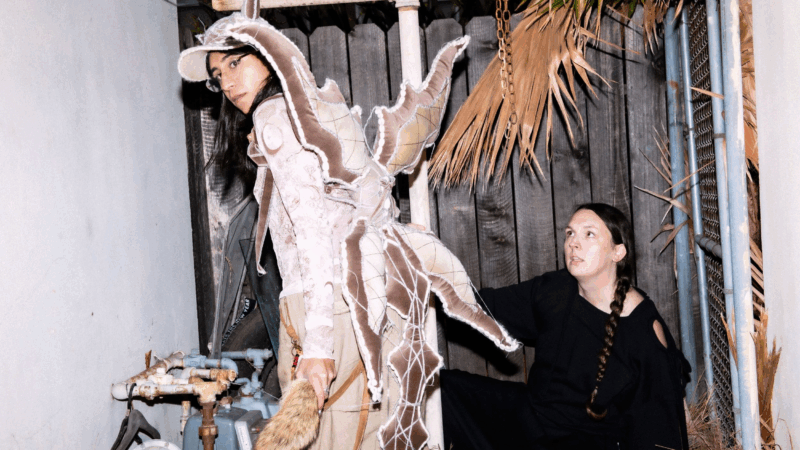In 2025, musicians keep making music for their inner child
Anyone who was personally traumatized as a child by the 1984 movie The NeverEnding Story will immediately recognize the furry, Falkor-like dragon head featured on the album cover of the debut album by the duo Disiniblud. In the photo, it sits aglow in the garage of a suburban house, experimental musicians and Disiniblud members Rachika Nayar and Nina Keith taking it in as if it were just another unearthed childhood memento gathering dust at a parents’ house.
Truthfully, I’ve had loose plans to rewatch The NeverEnding Story as an adult for years now, an ’80s fantasy film that follows a shy outcast who gets sucked into a magical storybook’s narrative. I suspect I keep putting it off because I don’t want to confront the scene where the central character’s horse, Artax, gets stuck in the Swamp of Sadness, which brought me to tears as a kid. But I also suspect I’ve been putting a rewatch off because the memory of the movie and what it meant to me as a child, how just out of reach its magic felt, could collapse in an adult viewing — that I’d just think it was corny, or worse.
Disiniblud’s self-titled album, released last month, is in many ways about evading that sort of collapse. It’s a stunning record that seeks to capture the imagination and vulnerability of being a kid, to reconnect with your childhood self and make music without adult self-consciousness. Glitchy, overpowering synths, delicate, skewered piano and howling vocals from a handful of talented collaborators collide in compositions that actually sound magical. Each song vibrates with a sense of playfulness and otherworldly possibility as Keith and Nayar build up songs from tinkering, music box melodies into epic soundscapes, as if to suggest reality can become fantasy at any moment. “It’s change!” a cartoonish voice exclaims on the song of the same name, with the excitement of a confident child sharing an earth-shattering discovery, but also extending an invitation — to pick up the magic book, to walk through the wardrobe, to let your guard down.
But for all of its beauty Disiniblud is also intense — songs like “Serpentine” and “My flickering gift to you” almost overwhelm their vocalists Cassandra Croft and Tujiko Noriko with layers of reverb and electronica, as if to suffocate or suppress them. For Keith and Nayar, both trans women, accessing their child selves isn’t a simple visit to a more innocent, rosier period of their lives, but a process that can be painful. “I think that your child self has so much to teach you about what parts of you you were told to injure and cut off and eject, but are always still there,” Nayar said at a listening event for the music publication Hearing Things. “The point of it is to open a door for both us and other people, to be able to walk through and be less numbed-out and more in tune with the parts of ourselves that we’re told to shut off.”
Disiniblud isn’t the only artist this year to rediscover the creative liberties of retreating into one’s child self. The Chicago trio Horsegirl went into recording the band’s delightful, minimalist sophomore album Phonetics On & On shaking off a bit of the influences of its noisy, shoegaze-indebted debut, focusing instead on making music that felt fun, intuitive and innocent. The Australian EDM artist Ninajirachi took a more direct approach on her recently released album I Love My Computer, an unusually autobiographical record for the festival-friendly genre, chronicling her first experiences falling in love with electronic music at 12 years old and beginning to make music on the songs like “Sing Good” and “iPod Touch,” which she says “sounds like something I would have loved at that pivotal time.” Each artist reaches back in time to revisit and retain the spirit of a younger self unburdened by creative overthinking or careerism. In doing so, they don’t just open a door to music-making as a space of revelation and limitless possibility, but also music-listening, inviting listeners to tune into the same sense of youthful wonder that still lurks inside all of us, if only we’d just open ourselves up to it.
Unlike the other albums, Forever Howlong, the surrealist, twee new LP by the English band Black Country, New Road, may not have been an intentional exploration of childhood whimsy, but it twists and turns with storybook images of knights and Salem witches, and earnest songs that use the language of adolescence to portray big — and sometimes dark — feelings. The album was made after a significant career shake-up: its lead singer leaving the band. “Do you wanna play forever?” member Georgia Ellery, who shares singing duties across the album with fellow bandmates, asks on “Besties,” a song that at first listen could be about the friendship of a couple of schoolgirls, but hints at a more adult yearning for something more. Does Ellery mean to play, as a child might, with her chosen “bestie?” Or does she mean to simply play as a musician, with her bandmates, forever? For BC, NR, and so many artists this year, making music can be one and the same.
Buddhist monks head to DC to finish a ‘Walk for Peace’ that captivated millions
The group of Buddhist monks is set to reach Washington, D.C., on foot Tuesday. The monks in their saffron robes have become fixtures on social media, along with their rescue dog Aloka.
Trump is threatening to block a new bridge between Detroit and Canada from opening
President Donald Trump on Monday threatened to block the opening of a new Canadian-built bridge across the Detroit River, in his latest salvo over cross-border trade issues.
Ghislaine Maxwell appeals for clemency from Trump as she declines to answer questions
Maxwell declined to answer questions from House lawmakers on Monday, but indicated that if President Trump ended her sentence, she was willing to testify that neither he nor former President Clinton had done anything wrong in their connections with Epstein.
Lindsey Vonn says she suffered ‘complex tibia fracture’ in her Olympic downhill crash
The 41-year-old star said her torn ACL was not a factor in her crash. "While yesterday did not end the way I had hoped, and despite the intense physical pain it caused, I have no regrets," she wrote.
Guerilla Toss embrace the ‘weird’ on new album
On You're Weird Now, the band leans into difference with help from producer Stephen Malkmus.
Nancy Guthrie search enters its second week as a purported deadline looms
"This is very valuable to us, and we will pay," Savannah Guthrie said in a new video message, seeking to communicate with people who say they're holding her mother.





